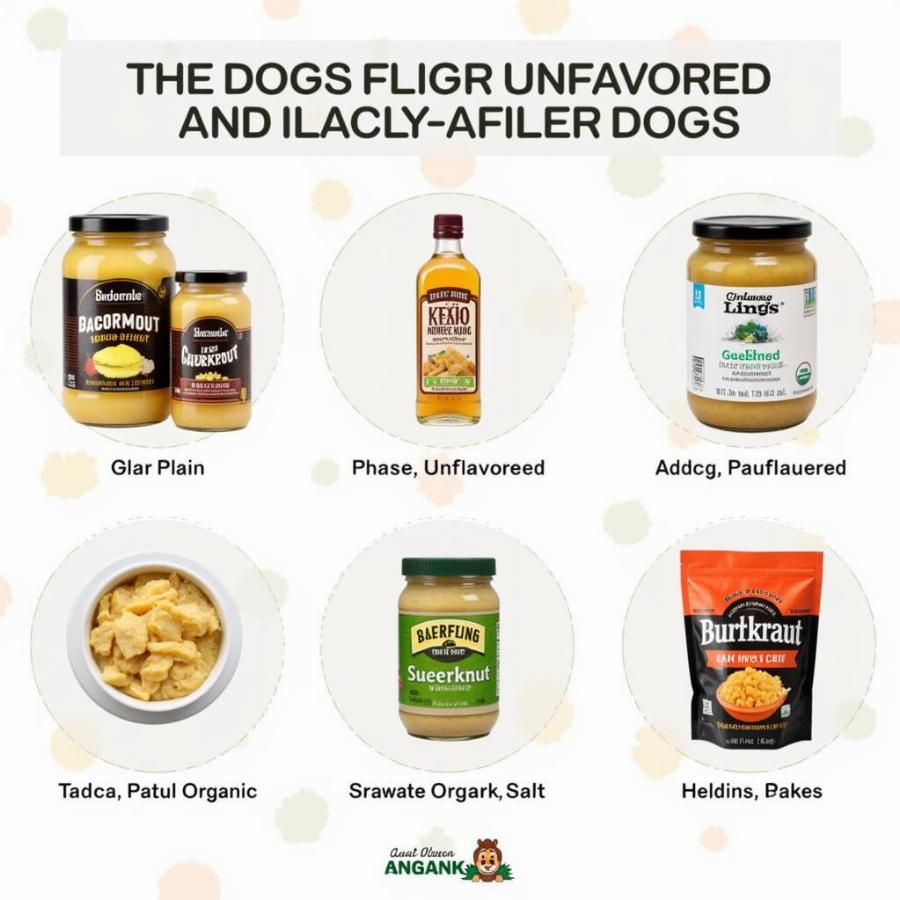Sauerkraut, that tangy fermented cabbage dish, is a popular condiment for humans. But what about our canine companions? Can dogs eat sauerkraut? The short answer is yes, dogs can eat sauerkraut, but there are some important considerations to keep in mind before adding this fermented food to your dog’s diet. This article will delve into the potential benefits and risks of feeding your dog sauerkraut, along with guidelines for safe and healthy consumption.
Understanding the Benefits of Sauerkraut for Dogs
Sauerkraut, rich in probiotics, can contribute to a healthy gut microbiome in dogs, much like it does in humans. These beneficial bacteria can aid digestion, boost the immune system, and even improve cognitive function. Furthermore, sauerkraut is packed with vitamins C and K, as well as various minerals like iron and fiber, all contributing to overall canine well-being. However, the fermentation process reduces the vitamin C content significantly.
It’s important to note that while anecdotal evidence suggests sauerkraut may alleviate certain digestive issues in dogs, scientific research specifically focusing on the effects of sauerkraut on canine health is limited. Always consult with your veterinarian before incorporating new foods, especially fermented ones, into your dog’s diet.
Can Dogs Eat Sauerkraut Every Day?
While sauerkraut can offer health benefits, moderation is key. Feeding your dog sauerkraut every day could lead to digestive upset due to its high fiber content. Start with a small amount and monitor your dog for any adverse reactions like gas, bloating, or diarrhea. If your dog tolerates sauerkraut well, you can gradually increase the amount, but it’s generally not recommended as a daily supplement.
What about other foods? Check out more about dogs and sauerkraut on our website.
Choosing the Right Sauerkraut for Your Dog
Not all sauerkraut is created equal, especially when it comes to canine consumption. Avoid sauerkraut with added salt, sugar, spices, or flavorings, as these can be harmful to dogs. Opt for unpasteurized, naturally fermented sauerkraut, ideally organic and made with just cabbage and salt. This ensures your dog receives the maximum probiotic benefits without the risk of ingesting potentially harmful additives.
How to Introduce Sauerkraut to Your Dog’s Diet
Start by offering your dog a very small amount of plain, unflavored sauerkraut. You can mix it with their regular food or offer it as a separate treat. Observe your dog closely for any digestive issues. If they tolerate it well, you can gradually increase the portion size over time. Remember to consult your veterinarian before making any significant changes to your dog’s diet.
 Variety of Sauerkraut Options for Canine Consumption
Variety of Sauerkraut Options for Canine Consumption
Is Sauerkraut Safe for Puppies?
Puppies have sensitive digestive systems, so introducing sauerkraut should be done with extra caution. It’s best to wait until your puppy is at least six months old and their digestive system is more developed. Even then, start with a tiny amount and monitor them carefully for any adverse reactions. If you have any concerns, consult your veterinarian.
What if My Dog Doesn’t Like Sauerkraut?
Not all dogs will enjoy the tangy flavor of sauerkraut. If your dog refuses to eat it, don’t force them. There are other ways to support their gut health, such as adding plain, unsweetened yogurt or probiotic supplements to their diet. Remember, a balanced diet and regular exercise are crucial for overall canine well-being.
“Probiotics are beneficial for gut health in both humans and dogs, but it’s essential to choose the right source and dosage for your canine companion. Always consult a veterinarian before adding any new supplements to your dog’s diet.” – Dr. Emily Carter, DVM
“Introducing new foods slowly and monitoring for any reactions is crucial. Every dog is different, and what works for one might not work for another.” – Dr. Michael Davis, DVM
Conclusion
Sauerkraut can be a healthy and beneficial addition to your dog’s diet when offered in moderation and with careful consideration. Choosing the right type of sauerkraut and monitoring your dog’s reaction is crucial. Always remember to consult your veterinarian before introducing any new food to your furry friend’s diet, especially if they have existing health conditions. By following these guidelines, you can safely introduce sauerkraut and potentially contribute to your dog’s overall digestive and immune health.
FAQs about Sauerkraut for Dogs
- Can I give my dog sauerkraut juice?
- What are the signs of a dog having a negative reaction to sauerkraut?
- Are there any dog breeds that shouldn’t eat sauerkraut?
- Can I give my dog sauerkraut with other fermented foods?
- How much sauerkraut should I give my small dog?
- Is cooked sauerkraut good for dogs?
- Can sauerkraut help with my dog’s allergies?
Interested in learning more about dog nutrition? Check out our articles on natural peanut butter for dogs, what to eat with hot dogs, and how to cook hot dogs without a grill. You might also find our article on carbs in hot dogs with bun useful.
Beaut Dogs is your one-stop resource for all things related to dog care, providing expert advice and reliable information to help you navigate the world of dog ownership. When you need personalized guidance, don’t hesitate to reach out to our support team at suport@beautdogs.com. We’re here to help you provide the best possible care for your furry friend.